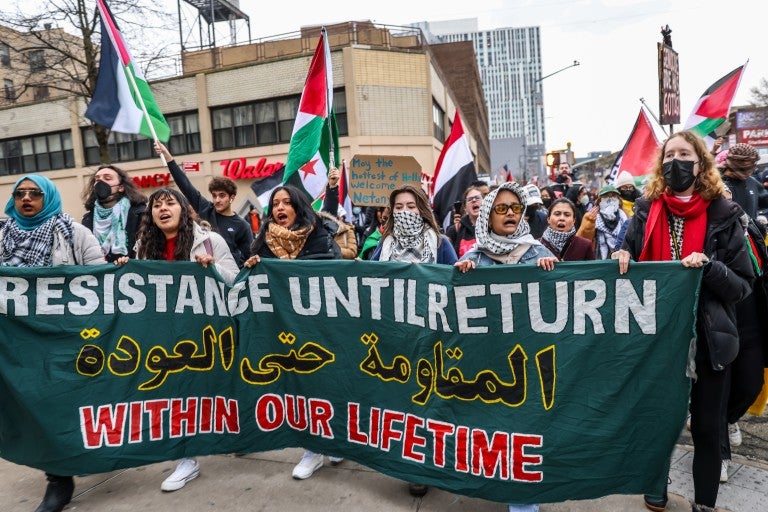April 26, 2018 — Jerusalem, Israel
By Eran Lerman
In a paradoxical sense, what brought into focus the question of Israel's red lines in Syria, since the beginning of 2018 in particular, was a positive turn of events: namely the near-obliteration of the Islamic State's area of brutal rule in Iraq and Syria. Unfortunately, the Iranians have been bold enough to claim this victory as their own despite the major roles played by both Russia and the US-led alliance in destroying IS forces. This has led to an even bolder assertion of their claim to hegemony across the region, as well as to a more aggressive stance towards Israel.
It should be made clear that when speaking of "the Iranians" in this context, the language refers to the Supreme (and unelected) Leader, Ali Khamene'i, his immediate circle of advisers, and to the Islamic Revolutionary Guard Corps (IRGC) commanders such as Qassem Suleimani, leader of their long arm, the al-Quds (Jerusalem) forces. President Rouhani and Foreign Minister Zarif have little to do with the decisions and actions taken on matters of military operations, national (read: revolutionary) security, subversion, intelligence and propaganda, the "sovereign functions" of the "Rahbar" (Guide), a title not unlike Hitler's in his day) in Tehran. Neither Rouhani nor Zarif have influence over, or even reliable information about, what their countrymen and their agents and proxies are up to in Syria and elsewhere in the region. Their calls for reconciliation with Saudi Arabia and the Gulf Arab states should thus be taken with a sizeable grain of salt.
What made this issue acute, well before the actual launch of an explosive-laden Iranian drone from a Syrian airbase against an undisclosed Israeli target on February 10, was first of all the growing sense among the relevant Iranian leaders that with Iran, Russia and Turkey now the masters of Syria, the country's territory can now be used at will for Iranian purposes (much as Turkey used parts of northern Syria as an open field for their anti-Kurdish campaign). The underlying assumption – which may now prove to have been premature – was that the West, led by the US, simply did not care enough about Syrian agonies to do anything about the consolidation of Iran's grip. This made it even more important for Israel to send a firm message and to back it up by action.
Two major, indeed vital, concerns drive the Israeli effort to draw clear red lines against the establishment of Syria as an Iranian base of operations. First, there is the direct prospect of more drone raids, possibly rocket fire, and other forms of penetrations from Syrian soil. This would be viewed as an extremely troubling development. It could break 44 years of almost uninterrupted calm, since the disengagement agreement of 1974, which had kept the Golan at peace (except for the occasional stray shell or bullet from the civil war raging close to the border since 2011). Even if not immediately used, this new option would serve Iran as an additional deterrent against the possibility, which is fast becoming real again, of Israeli, U.S., or even joint military action against Iran's nuclear infrastructure. After all, by May 12 (unless French President Macron has been able to shift the dates), sanctions could be reinstated, Iran may respond by resuming enrichment on course to the breakout point, and tensions could rise very quickly.
A significant side aspect of this consolidation in Syria is the light it sheds upon Hezbollah's dilemmas. Having shed much blood in fighting the Syrian people, their very legitimacy is now questioned by many in Lebanon. Many Sunnis harbor deeply vengeful sentiments which they may exercise – with all the ruthless brutality that has marked the conflict in recent years – if ever Hezbollah is weakened enough to make the Shi'ite population of Lebanon vulnerable. This, in turn, is what would happen if Hezbollah leader Hassan Nasrallah were to repeat today the mistake he admittedly made in 2006. Thus, while the Iranian leaders can ultimately force their proxy into battle, they will find it difficult to do so under present circumstances. Hence their interest in opening another front.
A third, potentially even more dangerous option would be to use Syrian soil to penetrate Jordan, destabilize it and use it for direct access to the West Bank and deep into Israel. Both Israel and Jordan, with U.S. backing and even Russian consent, are determined to prevent this from happening. This is Israel's ultimate red line: while some Iranian presence in Syria may be tolerated (after all, Assad's own troops are worn beyond any effective use; and if the Iranians were to leave, he would be reduced to asking for Russian boots on the ground), a threat to Jordan would not be.
Some Israelis, such as General (res.) Amos Yadlin, are therefore warning that this May will be the most dangerous since 1967. Perhaps so, with the U.S. Embassy move and the Palestinians marking 70 years since the "nakba" catastrophe (namely, the creation of Israel).
But a deterioration to war is far from inevitable. Deterrence, an ugly but useful concept, may now kick in, curbing Iranian responses and setting the stage for new and much more aggressive negotiations to "fix" the JCPOA.
Eran Lerman is the former deputy for foreign policy and international affairs at the National Security Council in the Israeli Prime Minister's Office. Prior to that, he served as director of AJC Jerusalem.
Photo by: Israeli Defense Forces


